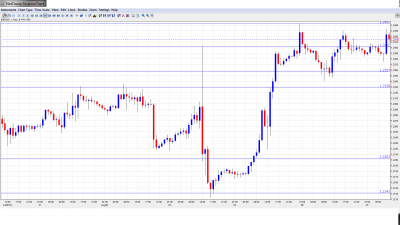EUR/USD continues to edge upwards, as market expectation is growing for a powerful ECB intervention to cut borrowing costs in Spain and Italy. Will we see a breakout by the euro? In economic releases, Italian Industrial Production and Preliminary GDP disappointed, as both posted declines. The markets will be keeping a close eye on German Factory Orders, as well as a speech from Fed Chair Bernard Bernanke later today.
Here’s an update about technical lines, fundamental indicators and sentiment regarding EUR/USD.
EUR/USD Technical
- Asian session: Euro/dollar dropped to 1.2376, before consolidating at 1.2386. In the European session, the pair pushed across the 1.24 line, and is moving upwards.
- Current range: 1.24 to 1.2440.
Further levels in both directions:
- Below: 1.24, 1.2360, 1.2330, 1.2288, 1.22, 1.2144, 1.2043, 1.20, 1.1876 and 1.17.
- Above: 1.2440, 1.2520, 1.2623, 1.2670, 1.2743 and 1.2814.
- 1.2440 is the next line of resistance, with 1.2520 much stronger.
- 1.24 is providing weak support.
Euro/Dollar moving upwards on expectations of ECB action – click on the graph to enlarge.
EUR/USD Fundamentals
- 8:00 Italian Industrial Production. Exp. -1.0%. Actual -1.4%.
- 9:00 Italian Preliminary GDP. Exp. -0.7%. Actual 0.7%.
- 10:00 German Factory Orders. Exp. -0.8%.
- Tentative: US Loan Officer Survey.
- 18:30 US Fed Chairman Ben Bernanke Speaks. He may elaborate on the recent decision not to act.
- 19:00 US Consumer Credit. Exp. 12.0B.
EUR/USD Sentiment
- Markets Waiting for Action by ECB: ECB head Mario Draghi declared that he will do “everything” to preserve the euro, but the markets are expecting concrete steps and not just tough talk, especially regarding Spanish and Italian bond buys. Draghi declared that bond yields are unacceptable, and that the ECB will explore ways to act in the coming weeks. These bond buys would be limited to the short end of the curve, but could be unsterilized – full QE. This is a significant move forward. Opposition came only from Germany, and not from other northern countries. Apart from the exploration, the actions also depend on a formal aid request. After many weeks of denial, Spain’s leader changed the tone and said he wanted to see what the ECB has to offer. He practically opened the door for an aid request. Things move slowly in Europe, but this may be the beginning of the change. Other ECB officials echoed Draghi’s words about the irreversibility of the euro.
- Troika reports progress in Greek talks: The EU / ECB / IMF delegation left Athens and said they were making progress in their negotiations with the Greek government. Talks are not scheduled to resume until September, after Greece has a scheduled bond repayment to the ECB. It is unclear where it will get the money from. In a personal vote of no-confidence, the former head of ATEbank, Theodoros Pantalakis, moved 8 million euros abroad. While the move is probably legal, it certainly has raised eyebrows. The odds for Greece exiting the euro-zone until the end of 2012 are rising.
- Non-Farm Payrolls surprise markets: After a long period of mixed data, the gain of 163K jobs in the US was great news. However, this may have been a one time event. Also, the Unemployment Rate inched up to 8.3%, from 8.2%. More positive data is needed from the US, but this all important figure is a step forward.
- Fed stays on sidelines, again: The Federal Reserve refrained from implementing fresh easing measures, despite troubling data from the US economy. The Fed took note that economic growth was stagnant in 2012, and reiterated that it stood ready to act if necessary. This is a repeat of what Bernanke said in the past, and the change of wording is subtle. Some participants see easing coming in December, while others see it very soon. The QE3 camp seems to miss a simple reality.
- Has Germany caught the Euro-zone flu?: Recent German economic data has been weak. PMIs, retail sales and business confidence all disappointed. The markets are clearly getting nervous, as a Germany in decline could spell disaster for the struggling Euro-zone and send the euro tumbling. Just to add oil to the fire, Moody’s recently reduced the outlook on Germany, the Netherlands and Luxembourg from stable to negative.
- Spanish regions complicate bailout picture: The euro-zone’s fourth largest economy is trying to focus the crisis on the banks, but also its regions are in deep trouble. No less than 6 regions may ask to tap into the national bailout fund. National sentiment is strongly felt in Catalonia, which banned a budget meeting. The regions are part of the complex picture. Currently, optimism from Draghi has pushed yields lower: 6.77% on the 10 year bonds. This is welcome news, as recent yields were above the dangerous 7% level.
- High yields and crushing debt weigh on Italy: Doubts about Draghi’s seriousness can be seen in his own country. The area’s third largest economy raised money in the markets with a yield of 5.96%, higher than 5.82% seen last time. The specter of early elections in which the anti-euro sentiment will gain traction also weighs on Italy, which now has a debt-to-GDP ratio of 123%, and with another GDP decline, has now spent one full year in recession. Meanwhile, Italian Prime Minister Mario Monti has warned that the disagreements among Euro-zone members are hampering an effective response to the debt crisis and threaten the stability of the EU.

